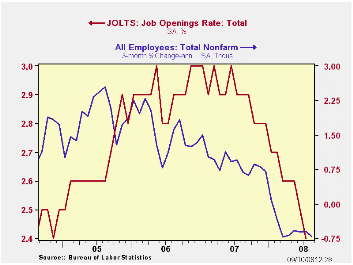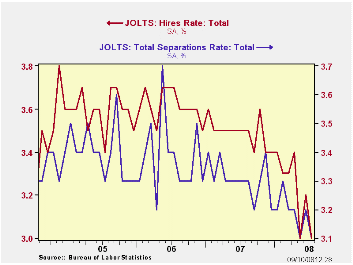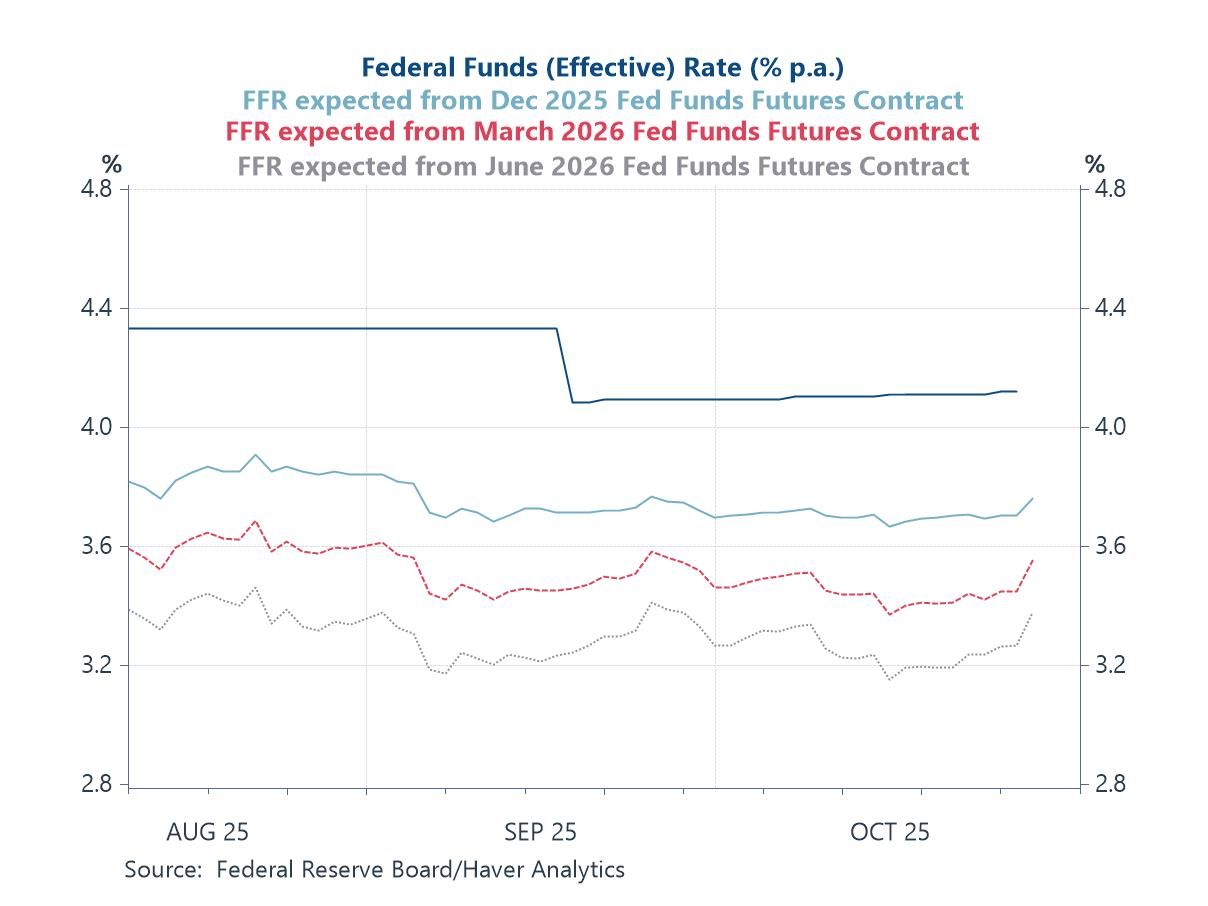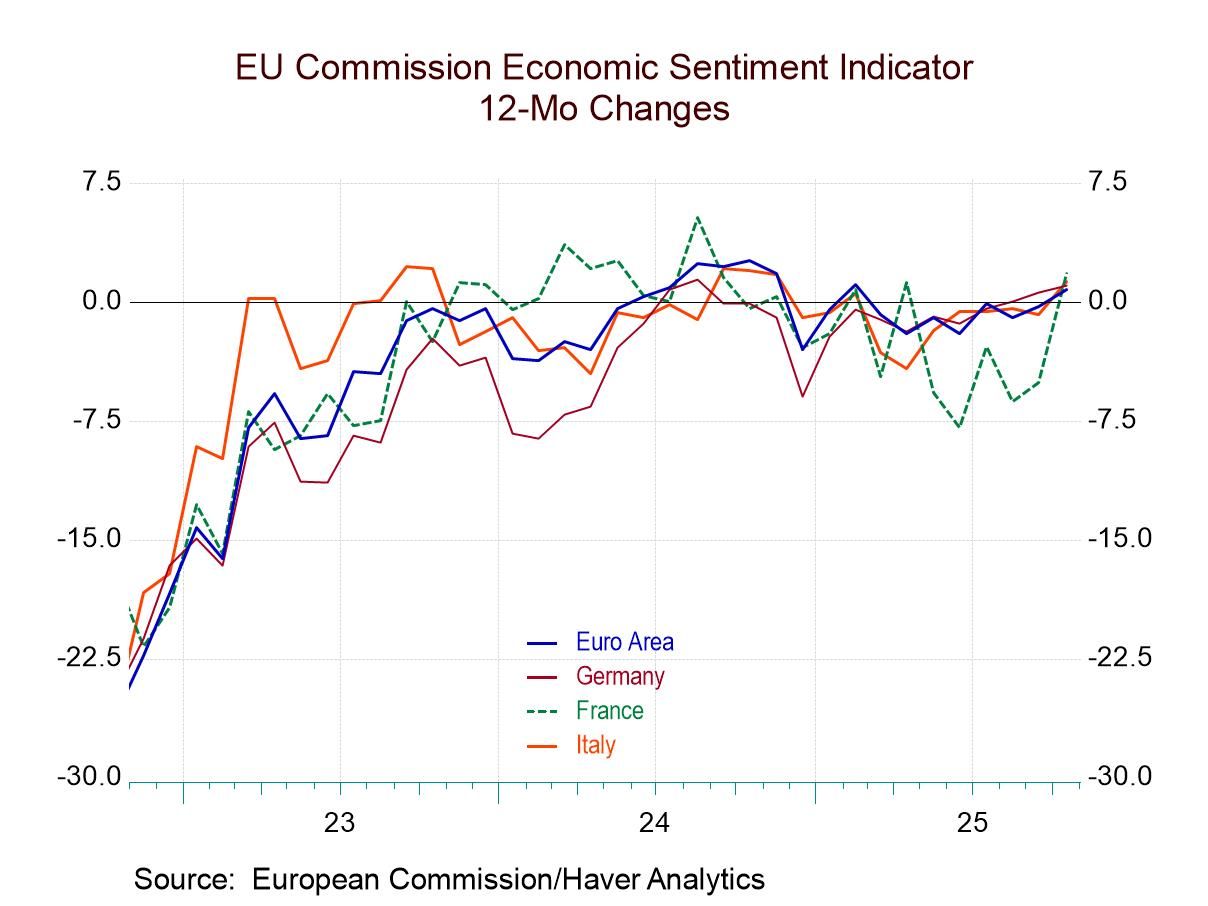 Global| Sep 10 2008
Global| Sep 10 2008JOLTS: U.S. Job Openings Fell in July
by:Tom Moeller
|in:Economy in Brief
Summary
The Bureau of Labor Statistics reported in the July Job Openings & Labor Turnover Survey (JOLTS) that the number of job openings fell a revised 2.3% (-17.0% y/y) from June. The drop followed a revised 3.7% June decline which was much [...]

The Bureau of Labor Statistics reported in the July Job Openings & Labor Turnover Survey (JOLTS) that the number of job openings fell a revised 2.3% (-17.0% y/y) from June. The drop followed a revised 3.7% June decline which was much larger than reported initially. Since the peak in January of 2007, the number of job openings have fallen 21%.
The job openings rate fell to 2.4% from a downwardly revised 2.5% in June. The latest figures are down from near 3% one year ago. The job openings rate is the number of job openings on the last business day of the month as a percent of total employment plus job openings.
The actual number of job openings in the construction sector fell 16.0% (-48.1% y/y) while the number of job openings in the manufacturing sector fell at the same rate as in June, by 3.3% (-29.6% y/y). Professional & business services job openings fell 10.4% (-12.4% y/y) while openings in the education & health sectors slipped 1.2% (-2.6% y/y) after an upwardly revised June increase of 5.2%. Openings in retail trade also reversed the prior month's decline with a 16.1% increase (-1.1% y/y).
By region, openings in the Northeast fell by 3.3% (-19.8% y/y). They were down by 5.6% (-15.1% y/y) in the South and off 4.3% (-15.3% y/y) in the Midwest.In the West openings rose by 5.3% (-20.2% y/y).
The hires rate fell to 3.0% from an upwardly revised June rate of 3.2%. The latest matched the low for this cycle and it was the lowest since early-2003.The hires rate is the number of hires during the month divided by employment.The actual number of hires fell 8.5% (-15.7% y/y). Hires in the construction sector fell by one-quarter m/m and they were off by one-third from last July. In the factory sector hires fell 11.2% (-28.7% y/y) and in the professional & business services sector they fell by 11.4% (-10.4% y/y). In the leisure and hospitality sector hires rose 4.6% during July but they still were off 10.8% y/y.
The job separations rate fell to 3.1%, the lowest since 2003 and down from 3.7% at the peak. Separations include quits, layoffs, discharges, and other separations as well as retirements. The level of job separations fell 3.5% y/y.
The JOLTS survey dates only to December 2000 but has since followed the movement in nonfarm payrolls, though the actual correlation between the two series is low.
A description of the Jolts survey and the latest release from the U.S. Department of Labor is available here.The Budget and Economic Outlook: An Update from the Congressional Budget Office can be found here
| JOLTS (Job Openings & Labor Turnover Survey) | July | June | July '07 | 2007 | 2006 | 2005 |
|---|---|---|---|---|---|---|
| Job Openings, Total | ||||||
| Rate (%) | 2.4 | 2.5 | 2.9 | 2.8 | 3.0 | 2.8 |
| Total (000s) | 3,416 | 3,497 | 4,116 | 3,974 | 4,272 | 3,863 |
| Hires, Total | ||||||
| Rate (%) | 3.0 | 3.2 | 3.5 | 41.9 | 43.4 | 43.1 |
| Total (000s) | 4,062 | 4,438 | 4,818 | 57,771 | 59,153 | 57,501 |
Tom Moeller
AuthorMore in Author Profile »Prior to joining Haver Analytics in 2000, Mr. Moeller worked as the Economist at Chancellor Capital Management from 1985 to 1999. There, he developed comprehensive economic forecasts and interpreted economic data for equity and fixed income portfolio managers. Also at Chancellor, Mr. Moeller worked as an equity analyst and was responsible for researching and rating companies in the economically sensitive automobile and housing industries for investment in Chancellor’s equity portfolio. Prior to joining Chancellor, Mr. Moeller was an Economist at Citibank from 1979 to 1984. He also analyzed pricing behavior in the metals industry for the Council on Wage and Price Stability in Washington, D.C. In 1999, Mr. Moeller received the award for most accurate forecast from the Forecasters' Club of New York. From 1990 to 1992 he was President of the New York Association for Business Economists. Mr. Moeller earned an M.B.A. in Finance from Fordham University, where he graduated in 1987. He holds a Bachelor of Arts in Economics from George Washington University.






